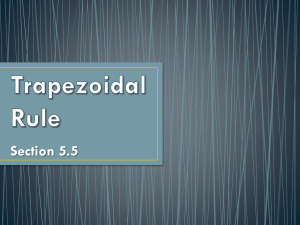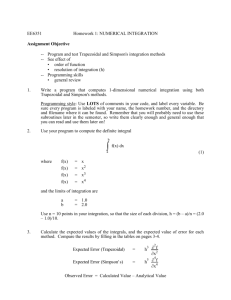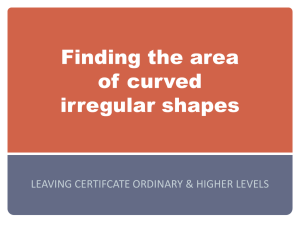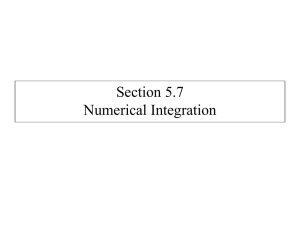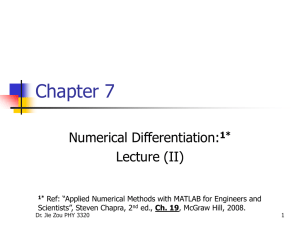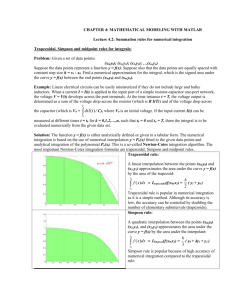Chapter 8
advertisement
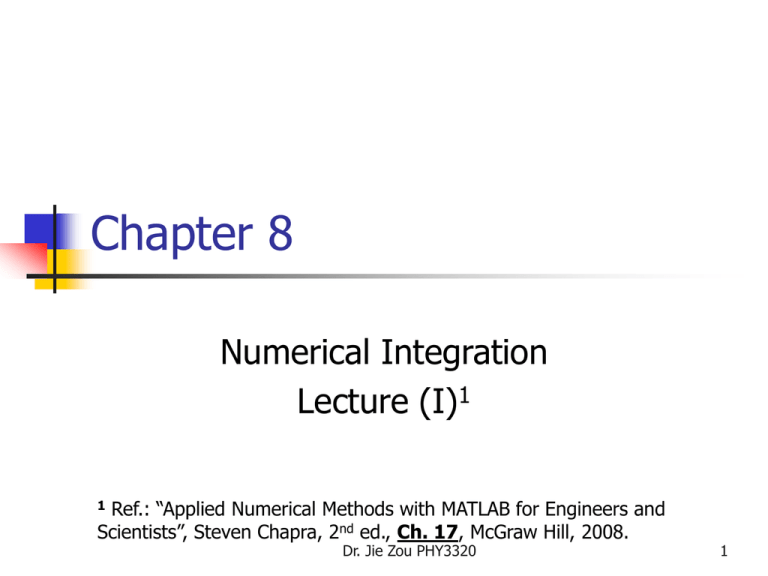
Chapter 8 Numerical Integration Lecture (I)1 Ref.: “Applied Numerical Methods with MATLAB for Engineers and Scientists”, Steven Chapra, 2nd ed., Ch. 17, McGraw Hill, 2008. 1 Dr. Jie Zou PHY3320 1 Outline Introduction What is integration? When do we need numerical integration? Applications of integration in engineering and science Newton-cotes formulas (1) The trapezoidal rule Error of the Trapezoidal rule The composite trapezoidal rule Implementation in MATLAB Dr. Jie Zou PHY3320 2 Introduction What is integration? Ref. Fig. 17.1 Graphical representation of the integral Mathematically: A definite integration is b represented by I f x dx . a It means: The total value, or summation, of f(x)dx over the range x = a to b. Graphical representation: For functions lying above the x axis, the integral corresponds to the area under the curve of f(x) between x = a and b. When do we need numerical integration (also referred to as quadrature)? Functions that are difficult to or cannot be integrated analytically. Only a table of discrete data are available. Dr. Jie Zou PHY3320 3 Applications of integration in engineering and science Examples related to “the integral as the area under a curve”: Examples related to the analogy between integration and summation: Ref. Fig. 17.3 An example: To determine the mean of a continuous function 4 Newton-cotes formulas Ref. Fig. 17.4 The approx. of an integral by the area under (a) a straight line and (b) a parabola Ref. Fig. 17.5 The approx. of an integral by the area under three straight-line segments Basic strategy: Replacing a complicated function or tabulated data with a polynomial that is easy to integrate. b b I f x dx f n x dx a a fn(x) = a0 + a1x + … + an-1xn-1+anxn n: The order of the polynomial. Dr. Jie Zou PHY3320 5 Newton-cotes formulas: (1) The trapezoidal rule Ref. Fig. 17.7 Single application Basic idea: Replacing the complicated function or tabulated data with a polynomial or a series of polynomials of the first order (linear). Single and Composite applications Single application formula: f a f b I b a 2 Width Average Height Composite application formula: n 1 f x0 2 f xi f xn Ref. Fig. 17.9 Composite application i 1 I b a 2n Width Average Height 6 Error of the trapezoidal rule For single applications, an estimate for the error: 1 1 3 3 Et f b a ; Ea f b a 12 12 If the function being integrated is linear, Et = 0; otherwise, Et 0. Ref. Fig. 17.8 Truncation error for a single application of the trapezoidal rule For composite applications, an estimate for the error: n Et Et ,i i 1 3 b a 12n 3 n f ; E i 1 i a 3 b a 12n 2 If the number of segments is doubled, Et is approximately quartered. b Here, f 1 f x dx b a a f 7 Example: Composite application of the trapezoidal rule Example 17.2 (Ref.): Use the two-segment trapezoidal rule to estimate the integral of f(x) = 0.2 + 25x – 200x2 + 675x3 – 900x4 + 400x5 from a = 0 to b = 0.8. Also, find the true error Et and the approximate error, Ea. x0 = a x1 Two segments n = 2; x2 = b (1) By hand. (2) Implement on a computerwrite an M-file. Dr. Jie Zou PHY3320 8 Results n 2 3 4 5 6 7 8 9 10 h 0.4 0.2667 0.2 0.16 0.1333 0.1143 0.1 0.0889 0.08 Dr. Jie Zou PHY3320 I 1.0688 1.3695 1.4848 1.5399 1.5703 1.5887 1.6008 1.6091 1.6150 t (%) 34.9 16.5 9.5 6.1 4.3 3.2 2.4 1.9 1.6 9 Implementation of composite trapezoidal rule on a computer Write an M-file called My_Trapezoidal_Rule.m to do Example 17.2. A copy of the code will be handed out later. Dr. Jie Zou PHY3320 10
